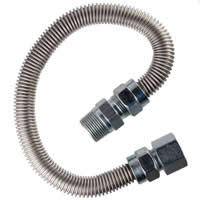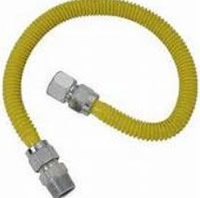Appliances and Connections
Appliances
Keep your natural gas appliances and/or equipment in good working condition by following these safety tips:
- Have your natural gas appliances and equipment cleaned and/or inspected for safety once a year by a trained, qualified plumbing, HVAC, or other qualified professional to ensure proper combustion.
- Maintain proper air circulation around gas appliances at all times.
- A gas flame should burn bright blue. A yellow or orange flame could indicate improper combustion or venting. Have your appliance checked if you believe your system is not working properly as carbon monoxide can be emitted from incomplete combustion.
- Keep flammable or combustible items away from gas appliances and equipment.
- Use natural gas equipment only for what it's designed to do. For example, you should never use a stove or oven for heating.
- Check your appliance’s connectors and replace any uncoated brass gas appliance connectors.
Appliance Connectors
Natural gas appliance connectors are corrugated metal tubes that connect gas appliances to your natural gas fuel lines. These lines can wear out from movement, bending, and corrosion, and should be checked periodically by a qualified professional to ensure they are in good working condition. When these connectors wear down, the can cause a natural gas leak or prevent the appliance from working correctly.
Connectors should be made of plastic coated brass, uncoated stainless steel, or plastic coated stainless steel. Older flexible connectors made of uncoated brass can weaken or crack over time. Although these connectors have not been made for more than 25 years they may still be in use on older appliances. This includes clothes dryers, water heaters, space heaters, stoves, or any other gas appliance. If your appliances have uncoated brass connectors, the connectors should be replaced immediately with stainless steel or plastic coated connectors. Contact a qualified professional to determine if you have brass connectors, and to have them replaced.
Connectors
Stainless steel connector

Yellow coated stainless gas connector

Appliance Connector FAQ
What is an appliance connector?
It is a corrugated metal tube that connects your natural gas appliances to the natural gas fuel lines. They are usually flexible when found on stoves, dryers, and cook tops, and should be solid on water heaters and furnaces.
What are the tubes made from?
Appliance connectors should be made of plastic coated brass, uncoated stainless steel, or plastic coated stainless steel. They should NOT be made of uncoated brass. Any connectors made of uncoated brass should be replaced immediately by a qualified and trained professional.
You should contact a qualified professional to have your connectors inspected.
How often should appliance connectors be replaced?
Appliance connectors wear out from movement, bending, and corrosion, and should be checked periodically by a qualified professional to ensure they are in good working condition. When these connectors wear down, the can cause a natural gas leak or prevent the appliance from working correctly. You should use caution when moving natural gas appliances so as to not damage or break the connector.
- Avoid repeated use of cleaning solutions or insect sprays around appliance connectors. These solutions can cause corrosion.
- Do not allow wiring or other objects to touch the connector.
- Replace connectors whenever an appliance is replaced or moved from its location. Moving a gas appliance can stress the connectors and cause a crack or leak.
What should I do if I move an appliance and break the connector, or if I smell natural gas near an appliance?
KUB recommends that you immediately leave the area where you smell natural gas and call 865-524-2911. We recommend following the three Rs: Recognize. React. KUB Responds.